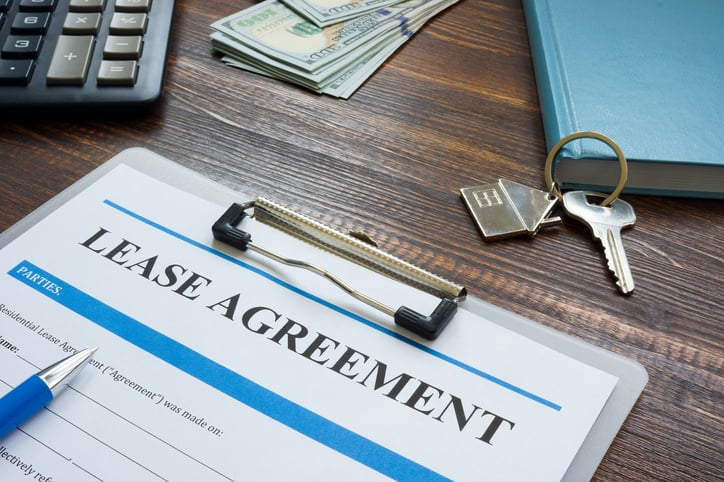Top Questions to Ask When Hiring a Property Manager
So, you’ve decided to rent your house when you PCS, and you'll hire a professional property manager. That’s awesome—you’ve figured out two of the biggest decisions in being a landlord!
But how do you know what property manager to hire? Your property manager can make your landlording experience smooth and painless, or they can be the biggest problem you have. You definitely want to do your research.
 Photo from iStock.com/Polina Lebed
Photo from iStock.com/Polina Lebed
Finding a Property Manager
Plan to interview at least three property managers. Where do you find them? Ideally, you get referrals. Social media can be great for this! If you can’t find actual referrals, consider using review websites like Yelp, but remember that people are far more likely to post reviews when they are unhappy. If you still can’t find good options, you may just have to pick at random. This can work out fine!
Start With Research
When selecting property management companies or individuals to interview, you may be able to narrow your list simply by doing some basic online research. Look for answers to these questions:
- Do they service properties in your location?
- How long have they been in business?
- Do they have any serious complaints or lawsuits that you can find online?
The Initial Screening
Initiate the conversation with an introductory phone call or email. This will help you avoid wasting time on a potential property manager who clearly isn’t a good fit. It will also help you cram in more questions because you are breaking them up into several conversations.Experience and Expertise
Begin by asking about the property manager's experience in managing single-family properties. Inquire about their background, certifications, and any relevant licenses they hold.
A reputable property manager should have a solid track record of managing properties similar to yours and be well-versed in local landlord-tenant laws and regulations.
- How many properties do they/the company manage?
- Are the properties tied to an individual property manager, or does the whole team cover the entire portfolio?
- Do the PMs own rental property themselves?
Costs and Fees
Learn about the company’s fees and costs. While most PMs in the same market have similar fees, you might find some surprises.
- Is there a set-up fee? Advertising fee? New tenant fee? Renewal fee?
- What are the monthly fees?
- What other surprise fees might come up?
- Do you keep a reserve in the landlord’s account from month to month?
- Who holds the security deposit?
Ask for a complete written list of fees before signing your property management agreement.
 Photo from iStock.com/karamysh
Photo from iStock.com/karamysh
Meeting with the Property Manager
If you're happy with the responses that you got from the email or phone call, you can move to an in-person interview. To avoid just asking a long list of questions, you want to chunk them into categories.
Is The Property A Good Fit?
When meeting in person, the PM should have thoughts about your property — both good thoughts and bad thoughts.
- What things do they recommend you change before putting the property on the market?
- Is there anything unique about your property that is going to create a management challenge, such as a pool or a restrictive homeowner’s association?
- How much do they think the property will rent for?
- What type of tenants do they think will be interested in your property?
Advertising and Vacancies
Vacancies can impact your rental income and overall profitability. Ask the property manager about their strategies for minimizing vacancies and finding new tenants quickly.
- How do they market the property?
- How do they determine rental rates?
- If a property isn’t renting, how do they determine WHY it isn’t renting?
- What is the average turnover time in your market?
At the same time, ask administrative questions about a vacant property.
- Does the PM move utilities to their name, or do you need to move the utilities to your name with each vacancy?
- Who will take care of the lawn and other maintenance on a vacant house?
- Do they charge any fees to you while the property is vacant?
Tenant Screening
A thorough tenant screening process is vital for finding reliable tenants who will pay rent on time and take care of your property. Ask the property manager about their tenant screening criteria, including credit checks, rental history, employment verification, and criminal background checks.
Does the PM make the final decision on tenants, or is the owner involved in that decision? A diligent screening process can minimize the risk of leasing to problematic tenants.
Maintenance and Repairs
A good maintenance system can keep tenants happy without increasing your costs unnecessarily.
- How are maintenance, repairs, and improvements handled?
- Does the PM have in-house providers or a network of reliable contractors and vendors for repairs?
- Can you use your own vendors?
- When will the PM initiate a repair without contacting the property owner?
- Is there a dollar amount threshold for repair approval from the owner?
- What is the expected turnaround time for tenant maintenance requests?
- Is there an additional fee for managing work, and when is that fee applied?
Consider asking how they would handle a common tenant scenario, such as the hot water not working. See if they talk the tenant through common troubleshooting techniques before calling in a professional.
Also, ask about inspections.
- How often do they inspect a property?
- Does your jurisdiction require any specific inspections?
- Is there a fee to the owner?
Financial Management
You want to have a clear picture of the rental collection financial management system.
- How do tenants pay rent?
- Does the PM hold rental payments before disbursing them to the owner? If so, how long?
It is common for owner payments to be transmitted in batches, perhaps once a week.
- If the tenants pay on time, what day of the month should you expect to receive your payment? How is the payment sent to the owner?
- What happens if the tenants don’t pay on time?
- When do late fees accrue, and who gets those late fees?
- How does the owner get detailed monthly statements outlining income and expenses?
- What about annual reports?
A competent property manager should have efficient rent collection processes in place and be transparent about financial matters.
 Photo from iStock.com/designer491
Photo from iStock.com/designer491
The Final Four
Once you've picked your favorite PM option, it's time to check off the last few items.
1) Insurance and Legal Compliance
Ensure that the property manager is knowledgeable about insurance requirements and legal compliance pertaining to rental properties.
- Do they carry adequate liability insurance and errors and omissions coverage?
- Do they require tenants to carry renters’ insurance?
- Do they require owners to carry umbrella liability insurance or have any specific endorsements on their rental policy (also sometimes called a fire policy or a landlord’s policy)?
- Do they have an ongoing relationship with a real estate attorney? Has their standard lease been vetted by that attorney?
- Are they up to date with federal, state, and local regulations governing landlord-tenant relationships?
Ask them to send you a copy of their PM agreement and standard lease agreement. Working with a property manager who is well-informed about legal obligations can protect you from potential liabilities and legal disputes.
2) References and Reviews
Ask the property manager for references from past or current clients. Keep in mind that some PMs think this is a privacy issue, so this may not be a red flag. But the way that they respond to the question may be a clue.
3) Ending the PM Agreement
Eventually, every property management agreement ends. Either you sell the property, move back into it, take over management yourself, or hire a new property management company. You want to know how that looks before you enter into the contract.
- When can the property management agreement be terminated?
- How much notice needs to be given?
- Are there costs associated with ending a PM agreement?
- If you sell, does the company have the right of first refusal for the sales listing?
4) Tenant Relations and Conflict Resolution
Dealing with issues and conflicts is an inevitable part of property management. Inquire about the property manager's approach to handling tenant complaints, disputes, and evictions if necessary.
- Are they skilled at mediating conflicts and finding solutions?
- If applicable, how are HOA violations handled?
- What does the eviction process look like in your market? How much does it cost, and how long does it take?
A property manager needs to balance tenant satisfaction with the owner’s need to have a rent-paying occupant. Hiring the right property manager can be the difference between a profitable and pleasurable owner experience or an expensive, problem-filled journey.
By learning more about the topics outlined above, you can evaluate prospective property managers and make an informed pick. A competent property manager can alleviate much of the stress associated with property ownership and help you maximize your returns in the long run.
Get further support and insights for your landlord journey with our free guide below.
If you enjoyed this blog post, please share it with the image below!






